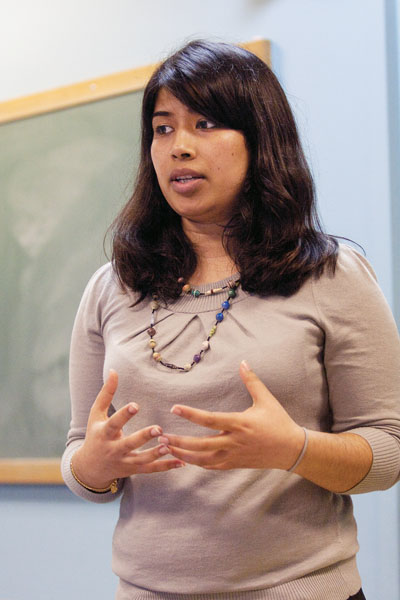In Review
 YOUTHFUL YEAR: In a program designed to match students and young graduates with programs in the community, Ferdous Zannat ’09 is working with refugees from Burma, Bhutan, and other countries. (Photo: Adam Fenster)
YOUTHFUL YEAR: In a program designed to match students and young graduates with programs in the community, Ferdous Zannat ’09 is working with refugees from Burma, Bhutan, and other countries. (Photo: Adam Fenster)When Ferdous Zannat ’09 was preparing to graduate, she knew she wanted to go on to medical school—but she didn’t want to start right away.
She had worked hard on her chemistry degree and, although eager to continue her studies, she was also ready for a break from student life. “I wanted to do something different for a year,” she says.
And so she has, working with women refugees in Rochester as a Rochester Youth Year fellow.
Begun in 2007, the program is run by a consortium of seven Rochester-area colleges and funded in part by the national AmericaCorps/VISTA program. It aims to alleviate youth poverty (Rochester has a child poverty rate of almost 42 percent), strengthen communities, and promote civic engagement and community-centered leadership.
“Rochester Youth Year contributes to our efforts to connect students and, in this case, recent alumni with the community,” says Glenn Cerosaletti, director of the University’s Rochester Center for Community Leadership. “The program allows graduates to remain in Rochester, contributing their talents full time” to those in need in the local area.
The fellows—since the program began, there have been 17, all graduates of the consortium colleges—have generated almost $200,000 in resources for the groups they have worked with and mobilized 1,000 volunteers to serve more than 2,000 youngsters in the community. Several have ultimately taken positions with their host organizations.
Four of this year’s nine fellows are University graduates: Kaitlin Fitzgerald ’09, who is working on a program to provide alternatives to suspension at the city’s Center for Youth; Kyvaughn Henry ’09, who is collaborating with Writers and Books, a literary center in Rochester, to provide outreach to city youth; Matt Merriman ’09, who is working on an entrepreneurship program for youth through the city’s parks and recreation department; and Zannat.
Through Westside Health Services, a health center that serves the northwest and southwest quadrants of the city, Zannat works with women from Burma, Bhutan, the Congo, and other countries to help them become health promoters in their own communities. Rochester is a refugee host city, and Zannat spent the first several months of her fellowship getting to know the newcomers to Rochester and those who provide services to them.
Eventually, Zannat assembled a group of women interested in becoming health promoters. They chose the topics about which they wanted to learn, and Zannat has worked with nurses and health educators to provide information sessions for them.
“They’re bridges to the community, from the health providers’ point of view,” says Zannat.
“The refugee communities in Rochester see Ferdous as a teacher whom they respect and admire,” says Louise Bennett, a clinical assistant professor of family medicine and a physician at Westside. She developed the project that Zannat is carrying out. “They benefit from her ability to synthesize complicated health information using her strong analytical and computer skills and translate it into a form they can both understand and have fun learning, her passion for advocacy, and her ability to reach out to women of many different cultures.”
Zannat’s connection with the women is fostered by her own experiences as an immigrant. She came with her family to the United States from Bangladesh when she was 11 years old.
“I understand the need for, and the urgency of, these programs,” she says. “I almost know what these families are going through, because we came as immigrants. As a child, you become an adult, because you pick up English faster.”
Zannat aims not just to arm the women with critical health information for themselves, their families, and their neighbors, but also to help them develop their own leadership skills.
“The program doesn’t do something for them—it builds their own capacities,” she says.
Zannat’s work is also institutional, as she builds volunteer connections between the University and the clinic and as she strives to help make Westside more effective in working with refugee populations.
“Everything I’m doing has to be self-sustaining,” says Zannat, whose fellowship is just for one year.
Zannat plans to stay involved as a medical student and, eventually, as a doctor.
Cerosaletti says Zannat work with the refugees exemplifies the engagement young people can bring to a program. “She’s such a great match, not only because she can strongly identify with that experience, but also because of her plans to pursue medicine and her academic studies here at the University.”
“It’s fascinating to see the ways that students take their academic studies here and translate them into service through this program,” says Cerosaletti.

